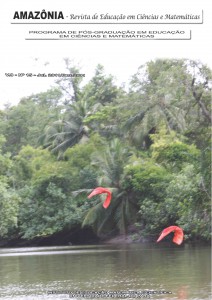Possibilities of articulating theory and practice by means of the collaborative research: A proposal for the teaching of mathematics
DOI:
https://doi.org/10.18542/amazrecm.v8i15.1681Keywords:
collaborative research, mathematical education, curriculumAbstract
This paper is about the possibilities of articulating theory-and-practice by means of collaborative research, as a proposal for the teacher to face the dynamic everyday challenges using mathematical tools. The methodology is based on a literature review through which we study and analyze various books, articles and dissertations on the subject. From the readings and analysis, we constructed a proposal to address collaborative research as an alternative link between theory and practice, to allow more dynamism to the teaching of mathematics, in an attempt to develop knowledge and pedagogical practices that contribute to a broader formation, which prepares for citizenship and for being a critical student and teacher. Conjectures were proposed on the possible contributions of collaborative research between teacher and students in using the trends in mathematics education as differentiated alternatives. We believe, therefore, that this work will contribute to a reflection on the importance of mathematics education in the training of students attending a licentiateship in mathematics, in which, in addition to subject knowledge (content), are also essential the pedagogical, curricular and experiential knowledge, to face the obstacles related to the math teachingReferences
ARAGÃO, Rosália M. R. de. Questões de Autonomia e de Competência: Relações de qualidade educativa do trabalho docente.Anais do XXI Simpósio Brasileiro de Administração da Educação. III Congresso Luso-Brasileiro de Política e Administração da Educação, ANPAE, Recife, Nov.2003.
ASSUDE, Tereza.Elementos de reflexão sobre a análise e o desenvolvimento curricular. Versailles: IREM, 1998.
BOAVIDA, A. M., PONTE, J. P. Investigação colaborativa: potencialidades e problemas. In: GTI (Org.) Reflectir e investigar sobre a prática profissional. Lisboa: APM, p. 43-55, 2002.
BONDÍA, J. L. Notas sobre a experiência e o saber da experiência. Revista Brasileira de Educação. n. 19, p. 20-28. jan/fev/mar/abr. 2002.
CHRISTIANSEN, H. [et all]. Making the connections.In:CHRISTIANSEN,H. [et all]Recreating relationships: Collaboration and educational reform. New York, NY: State University of New York Press.p. 283-292, 1997.
CHRISTIANSEN,I.Are theories in mathematics education of any use to practice? For the Learning of Mathematics, 19(1), 1999, p. 20-23.
CLANDININ, J.S. Classroom practice: teacher Images in action. London: Falmer Press, 1986.
CONTRERAS, José. A autonomia de professores. São Paulo: Cortez, 2002.
FULLAN, M. Change forces: Probing the depths of educational reform. London: The Falmer Press, 1993.
FULLAN, M.,HARGREAVES, A. Teacher development and educational change.In M. London: Falmer Press, 1992, p.1-9.
GOULET, L., AUBICHON, B. Learning collaboration: Research in a first nations teacher education program. In: Christiansen, H [et all]. Recreating relationships: Collaboration and educational reform. New York, NY: State University of New York Press, p. 115-127, 1997.
GROSSMAN, P. Teachers’ knowledge.In:ANDERSON, L. (Ed.), International encyclopedia of teaching and teacher education (2nd edition). Pergamon.
IMBERNÓN, Francisco. Formação docente e profissional: formar-se para mudança e incerteza. São Paulo: Cortez, 2010.
OLSON, M. Collaboration: An epistemological shift. In: Christiansen, H. [et all] Recreating relationships: Collaboration and educational reform. New York, NY: State University of New York Press.p. 13-25, 1997.
PONTE, J. P. Concepções dos professores de matemática e processos de formação. In Educação Matemática: Temas de Investigação. Lisboa: IIE, p. 185-239, 1992.
PONTE, J. P., SERRAZINA, M. L. Professores e formadores investigam a sua própria prática. Zetetiké, 11(20), p. 51-84, 2003.
SCHÖN, D. A. Educando o profissional reflexivo: um novo design para o ensino e aprendizagem.Tradução de Roberto Cataldo Costa.Porto Alegre: Artes Médicas Sul, 2000.
SHULMAN, L. Those who understand: Knowledge growth in teaching. Educational Researcher, 15, 4-14, 1986.
SIMÕES, C. O desenvolvimento do professor e a construção do conhecimento pedagógico. Aveiro: Fundação João Jacinto de Magalhães, 1996.
SKOVSMOSE, Ole. Educação matemática crítica: a questão da democracia. São Paulo: Papirus, 2001.
SKOVSMOSE, O.; VALERO, P. Breaking political neutrality: the critical engagement of mathematics education with democracy. In: ATWEH, B. [et all] (ed.). Sociocultural research on mathematics education: an international perspective. New Jersey: LEA, p. 37-55, 2001.
TAVARES, J. A aprendizagem como construção de conhecimento pela via da resolução de problemas e da reflexão. Aveiro: CIDInE, 1992.
YINGER,R. Examining thought in action: a theoretical and methodological critique of research on interactive teaching. Teaching and teacher education.Vol.2.n. 3. 1986, p. 263-282.



